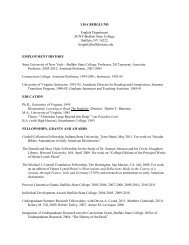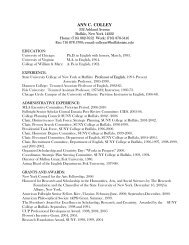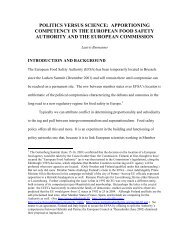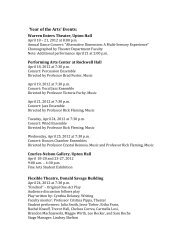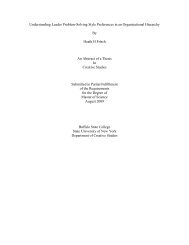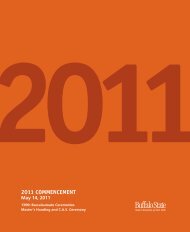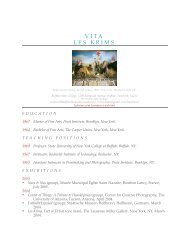Arts - Buffalo State College
Arts - Buffalo State College
Arts - Buffalo State College
You also want an ePaper? Increase the reach of your titles
YUMPU automatically turns print PDFs into web optimized ePapers that Google loves.
76<br />
Health and Wellness<br />
There has been a lot of controversy over the effectiveness of<br />
ginkgo biloba. We examined peer-reviewed research to enhance<br />
our understanding of its role in mental health. Our Poster<br />
examined the claims made about the effectiveness, the methods of<br />
supplementation, and the possible dangers of using ginkgo biloba.<br />
Functional claims made about ginkgo biloba include its use in<br />
supporting cognitive function and encouraging blood flow to the<br />
brain and extremities. It, therefore, has been used for Alzheimer’s<br />
disease, dementia, Reynaud’s syndrome, peripheral vascular disease,<br />
glaucoma, and sexual dysfunction. Ginkgo biloba extract (GBE)<br />
is made from the leaves of the tree and can be found in tablets,<br />
capsules, and teas. Ginkgo biloba extract is composed of two major<br />
components–ginkgo flavonglycosides and terpene lactones – and<br />
standardized extraction methods are used to ensure that these<br />
compounds are in the proper ratio. Ginkgo biloba does have some<br />
potential safety concerns. It may interact with some medications<br />
and other supplements, including ibuprofen, anticoagulant and<br />
antiplatelet drugs, anti-seizure medications, St. John’s Wort,<br />
glutamine, and melatonin. Some contraindications for use include<br />
pregnancy and breast-feeding, Diabetes Mellitus, and bleeding<br />
disorders.<br />
Presentation Type and Session: Poster IV<br />
Emotional Intelligence and Alcohol In<br />
the Family<br />
Tricia Lewis, SWK 307: Human Behavior 1<br />
Faculty Mentor: Professor Patrick Dexter, Social Work<br />
Emotional intelligence (EI) is a skill that should be acquired at<br />
a young age and used throughout a person’s lifetime. EI is beneficial<br />
in enabling a person to react favorably in negative situations. It also<br />
allows individuals to attune themselves to the feelings of others,<br />
ensuring strong and healthy relationships. The consequences of not<br />
developing or having low EI can be the determining factor between<br />
whether an individual has a fulfilling life or falls short of happiness.<br />
An individual is more likely to develop emotional intelligence if<br />
he or she was brought up in an environment that encourages<br />
positive thinking and behaviors. An individual that grows up with<br />
an alcoholic parent is less likely to be exposed to positive attitudes<br />
and behaviors and therefore less likely to possess EI. The research<br />
below looks at the possible connection between growing up in an<br />
alcoholic household and the development of emotional intelligence.<br />
I have reviewed studies conducted on children’s EI and compared<br />
them with studies done on the children in alcoholic families. From<br />
my research I have found compelling evidence that suggests a<br />
connection between a child’s low EI and their upbringing in an<br />
alcoholic family.<br />
Presentation Type and Session: Poster V<br />
How Multi-Cultural Exposure Impacts the<br />
Social Health of <strong>College</strong> Students<br />
Alexis Amankwanor, Health and Wellness<br />
Mentors: Professor Sarah Finocchario-Kessler, Preventive Medicine<br />
and Public Health (Kansas University Medical Center) and Dr.<br />
Sandra Washington, Director, McNair Scholars Program<br />
This research project will explore whether studying abroad or<br />
being exposed to various cultures has an impact on the social health<br />
of college students. There are many programs that would be able<br />
to provide testimonials about the impact studying abroad has on<br />
students, but they are often based on individual’s experiences and<br />
is not measured in a way to provide concrete findings that support<br />
the testimonials. The goal of this project is to bridge that gap and<br />
provide a way to measure student’s experience abroad and assess<br />
the effects it has on their social health. The students that will be<br />
participating are students from the Semester at Sea voyage in Fall<br />
2011 operated by the nonprofit Institute for Shipboard Education<br />
administered through the University of Virginia. This program<br />
offers rigorous coursework coupled with field assignments and<br />
service learning for students from a variety of universities (SAS).<br />
The estimated number of participants is between 300-400 students.<br />
Pre quiz evaluation forms will be distributed the week the program<br />
commences and the post quizzes will be distributed a week before<br />
the program ends. Three domains of social health will be measured;<br />
intrapersonal satisfaction, interpersonal satisfaction and future<br />
aspirations. The findings of this research project is currently under<br />
way, by being able to effectively assess study abroad programs,<br />
administrators will be able to serve students and their needs more<br />
effectively. This service along with others can help and guide students<br />
looking to cope with certain conditions they may face and their<br />
overall success during their collegiate career and beyond.<br />
Presentation Type and Session: Oral – Social Sciences<br />
Implementation and Evaluation of the<br />
“Got Health?” Program<br />
Samantha Panzica, Jason Ribbeck, and Joelle DelMonte,<br />
HEW 488: Internship<br />
Mentors: Dr. Jonathan Lindner, Center for Health and Social<br />
Research and Dr. William Wieczorek, Center for Health and Social<br />
Research<br />
The purpose of this study is to evaluate the influence of the “Got<br />
Health?” program, a youth wellness based program specifically<br />
focused on enhancing one’s health knowledge while providing<br />
necessary tools needed to adopt and maintain positive health<br />
behaviors and improving self-worth. The study aims to assess the<br />
health knowledge of the one hundred public, private, and charter<br />
school seventh and eighth grade youth who attended the 17th<br />
Annual Youth Police Academy at <strong>Buffalo</strong> Police Headquarters on<br />
Saturday March 24, 2012. The survey topics include key measures<br />
of overall health, including physical activity, nutrition, sleep, alcohol<br />
and drug consumption, perceived risk of harm from use, mental<br />
and social awareness, and demographics (age, ethnicity, gender,




